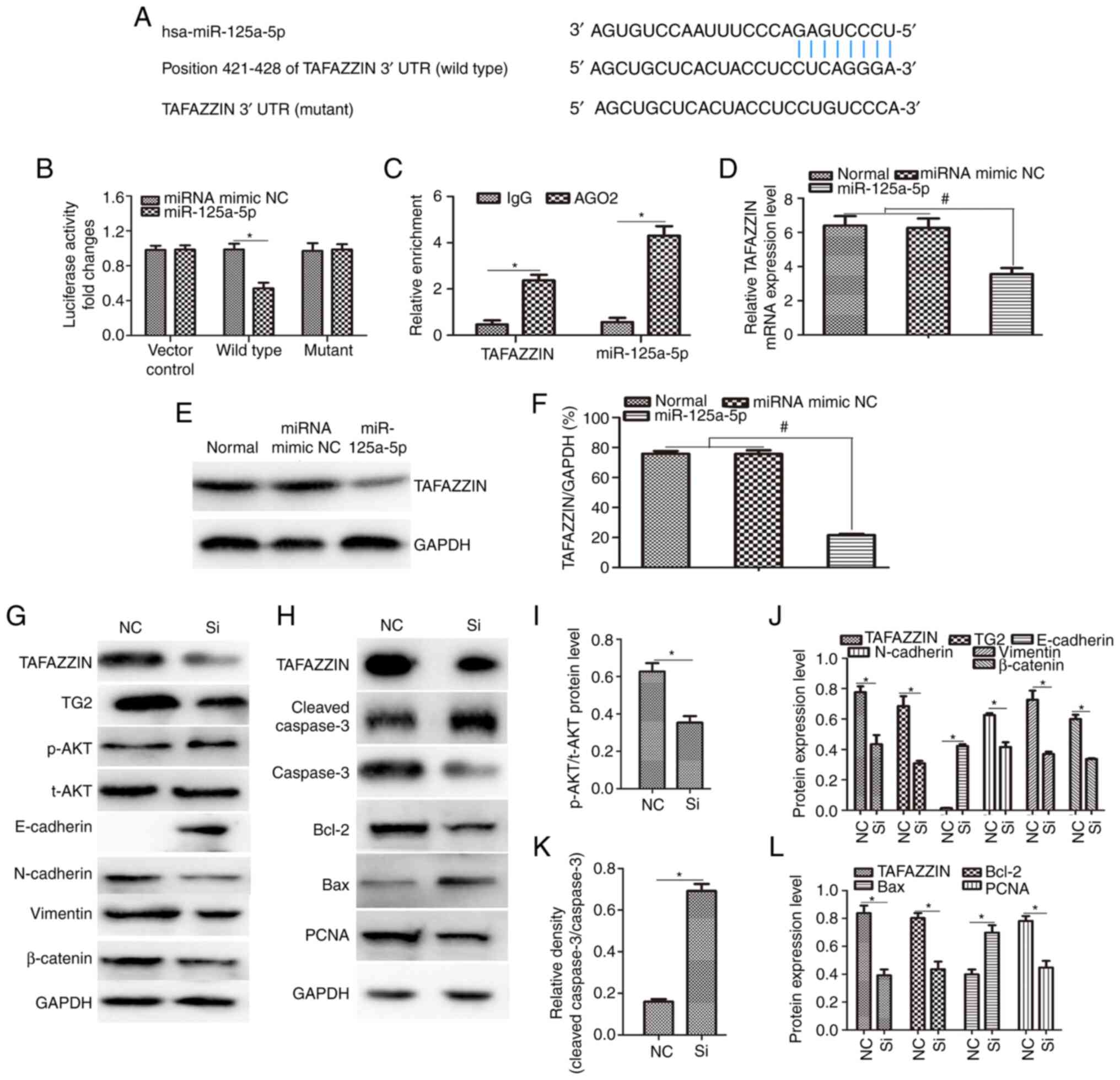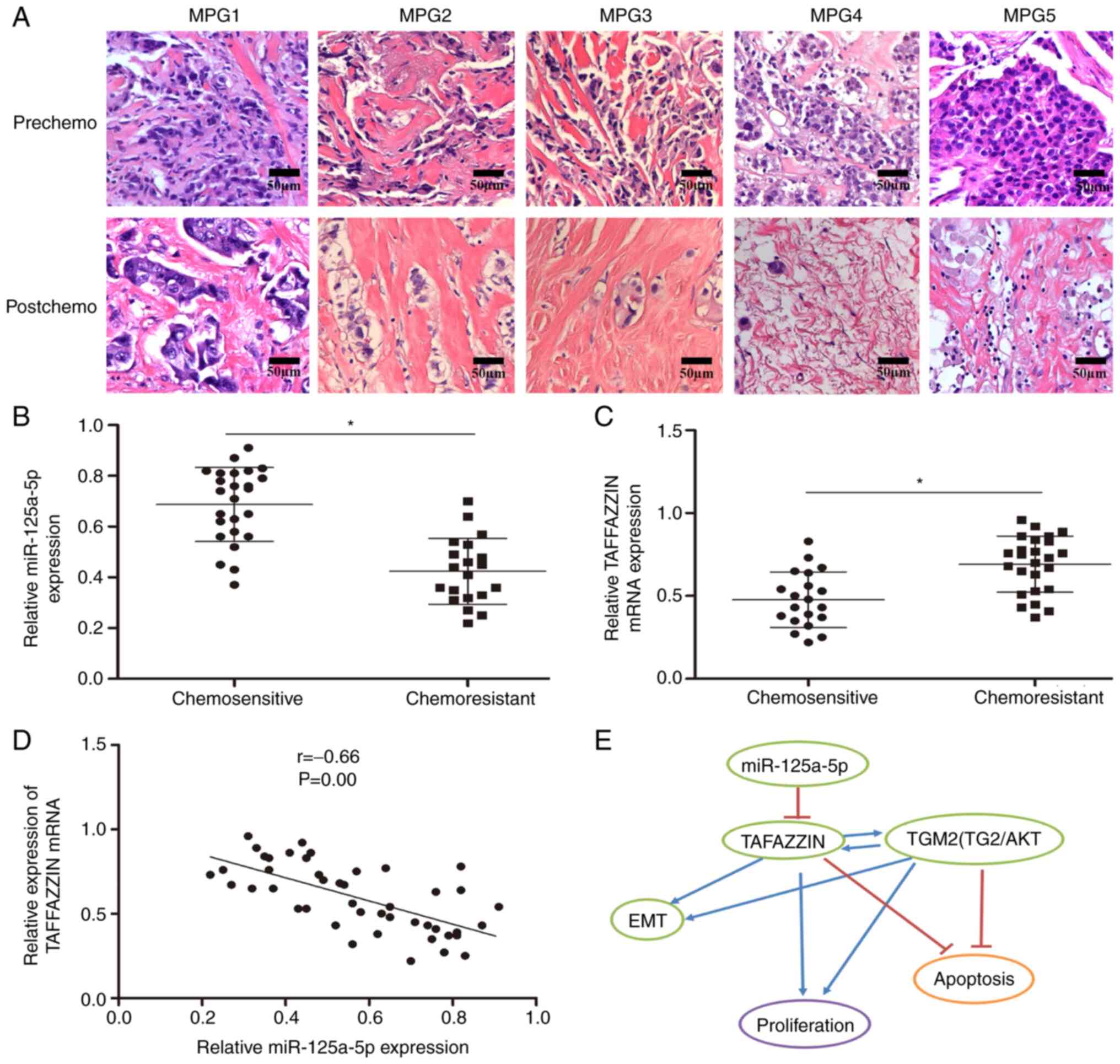|
1
|
Siegel RL, Miller KD and Jemal A: Cancer
statistics, 2020. CA Cancer J Clin. 70:7–30. 2020. View Article : Google Scholar : PubMed/NCBI
|
|
2
|
Zaheed M, Wilcken N, Willson ML, O'Connell
DL and Goodwin A: Sequencing of anthracyclines and taxanes in
neoadjuvant and adjuvant therapy for early breast cancer. Cochrane
Database Syst Rev. 2:CD0128732019.PubMed/NCBI
|
|
3
|
Kumar S, Nandi A, Singh S, Regulapati R,
Li N, Tobias JW, Siebel CW, Blanco MA, Klein-Szanto AJ, Lengner C,
et al: Dll1+ quiescent tumor stem cells drive chemoresistance in
breast cancer through NF-κB survival pathway. Nat Commun.
18:4322021. View Article : Google Scholar : PubMed/NCBI
|
|
4
|
Khordadmehr M, Shahbazi R, Sadreddini S
and Baradaran B: miR-193: A new weapon against cancer. J Cell
Physiol. 234:16861–16872. 2019. View Article : Google Scholar : PubMed/NCBI
|
|
5
|
Zhang YM, Wu QM, Chang LY and Liu JC:
miR-34a and miR-125a-5p inhibit proliferation and metastasis but
induce apoptosis in hepatocellular carcinoma cells via repressing
the MACC1-mediated PI3K/AKT/mTOR pathway. Neoplasma. 67:1042–1053.
2020. View Article : Google Scholar : PubMed/NCBI
|
|
6
|
Xu X, Tao Y, Niu Y, Wang Z, Zhang C, Yu Y
and Ma L: miR-125a-5p inhibits tumorigenesis in hepatocellular
carcinoma. Aging (Albany NY). 11:7639–7662. 2019. View Article : Google Scholar : PubMed/NCBI
|
|
7
|
Vo DT, Karanam NK, Ding L, Saha D, Yordy
JS, Giri U, Heymach JV and Story MD: miR-125a-5p functions as tumor
suppressor microRNA and is a marker of locoregional recurrence and
poor prognosis in head and neck cancer. Neoplasia. 21:849–862.
2019. View Article : Google Scholar : PubMed/NCBI
|
|
8
|
Chen Y, Han H, Seo G, Vargas RE, Yang B,
Chuc K, Zhao H and Wang W: Systematic analysis of the hippo pathway
organization and oncogenic alteration in evolution. Sci Rep.
10:31732020. View Article : Google Scholar : PubMed/NCBI
|
|
9
|
Ma S, Meng Z, Chen R and Guan KL: The
hippo pathway: Biology and pathophysiology. Ann Rev Biochem.
88:577–604. 2019. View Article : Google Scholar : PubMed/NCBI
|
|
10
|
Moroishi T, Hansen CG and Guan KL: The
emerging roles of YAP and TAZ in cancer. Nat Rev Cancer. 15:73–79.
2015. View
Article : Google Scholar : PubMed/NCBI
|
|
11
|
Ma W, Cui Y, Liu M, Tan Z and Jiang Y:
Downregulation of miR-125b promotes resistance of glioma cells to
TRAIL through overexpression of Tafazzin which is a mitochondrial
protein. Aging (Albany NY). 11:2670–2680. 2019. View Article : Google Scholar : PubMed/NCBI
|
|
12
|
Kriz V and Korinek V: Wnt, RSPO and hippo
signalling in the intestine and intestinal stem cells. Genes
(Basel). 9:202018. View Article : Google Scholar : PubMed/NCBI
|
|
13
|
Cao Y, Shen T, Zhang C, Zhang QH and Zhang
ZQ: MiR-125a-5p inhibits EMT of ovarian cancer cells by regulating
TAZ/EGFR signaling pathway. Eur Rev Med Pharmacol Sci.
23:8249–8256. 2019.PubMed/NCBI
|
|
14
|
Yang M, Tang X, Wang Z, Wu X, Tang D and
Wang D: miR-125 inhibits colorectal cancer proliferation and
invasion by targeting TAZ. Biosci Rep. 39:BSR201901932019.
View Article : Google Scholar : PubMed/NCBI
|
|
15
|
He W, Sun Z and Liu Z: Silencing of TGM2
reverses epithelial to mesenchymal transition and modulates the
chemosensitivity of breast cancer to docetaxel. Exp Ther Med.
10:1413–1418. 2015. View Article : Google Scholar : PubMed/NCBI
|
|
16
|
Gu M and Shen C: Novel cancer cell lines
derived from primary breast tumors in Chinese patients. Am J Transl
Res. 10:3956–3968. 2018.PubMed/NCBI
|
|
17
|
Shen C, Gu M, Liang D, Miao L, Hu L, Zheng
C and Chen J: Establishment and characterization of three new human
breast cancer cell lines derived from Chinese breast cancer
tissues. Cancer Cell Int. 9:22009. View Article : Google Scholar : PubMed/NCBI
|
|
18
|
Livak KJ and Schmittgen TD: Analysis of
relative gene expression data using real-time quantitative PCR and
the 2(-Delta Delta C(T)) method. Methods. 25:402–408. 2001.
View Article : Google Scholar : PubMed/NCBI
|
|
19
|
Yun H, Shi R, Yang Q, Zhang X, Wang Y,
Zhou X and Mu K: Over expression of hRad9 protein correlates with
reduced chemosensitivity in breast cancer with administration of
neoadjuvant chemotherapy. Sci Rep. 4:75482014. View Article : Google Scholar : PubMed/NCBI
|
|
20
|
Ogston KN, Miller ID, Payne S, Hutcheon
AW, Sarkar TK, Smith I, Schofield A and Heys SD: A new histological
grading system to assess response of breast cancers to primary
chemotherapy: Prognostic significance and survival. Breast.
12:320–327. 2003. View Article : Google Scholar : PubMed/NCBI
|
|
21
|
Luo J, Yao JF, Deng XF, Zheng XD, Jia M,
Wang YQ, Huang Y and Zhu JH: 14, 15-EET induces breast cancer cell
EMT and cisplatin resistance by up-regulating integrin αvβ3 and
activating FAK/PI3K/AKT signaling. J Exp Clin Cancer Res. 9:232018.
View Article : Google Scholar : PubMed/NCBI
|
|
22
|
Jang GY, Jeon JH, Cho SY, Shin DM, Kim CW,
Jeong EM, Bae HC, Kim TW, Lee SH, Choi Y, et al: Transglutaminase 2
suppresses apoptosis by modulating caspase 3 and NF-kappaB activity
in hypoxic tumor cells. Oncogene. 21:356–367. 2010. View Article : Google Scholar : PubMed/NCBI
|
|
23
|
Cai Z, Li J, Zhuang Q, Zhang X, Yuan A,
Shen L, Kang K, Qu B, Tang Y, Pu J, et al: MiR-125a-5p ameliorates
monocrotaline-induced pulmonary arterial hypertension by targeting
the TGF-β1 and IL-6/STAT3 signaling pathways. Exp Mol Med. 27:1–11.
2018. View Article : Google Scholar : PubMed/NCBI
|
|
24
|
Li Z, Jiang J, Tian L, Li X, Chen J, Li S,
Li C and Yang Z: A plasma mir-125a-5p as a novel biomarker for
Kawasaki disease and induces apoptosis in HUVECs. PLoS One.
3:e01754072017. View Article : Google Scholar : PubMed/NCBI
|
|
25
|
Wang LB, Feng L, He J, Liu B and Sun JG:
MiR-125a-5p inhibits the proliferation and invasion of breast
cancer cells and induces apoptosis by targeting GAB2. Math Biosci
Eng. 29:6923–6933. 2019. View Article : Google Scholar : PubMed/NCBI
|
|
26
|
Fu Y and Cao F: MicroRNA-125a-5p regulates
cancer cell proliferation and migration through NAIF1 in prostate
carcinoma. Onco Targets Ther. 17:3827–3835. 2015. View Article : Google Scholar : PubMed/NCBI
|
|
27
|
Wang C, Li D, Zhang S, Xing Y, Gao Y and
Wu J: MicroRNA-125a-5p induces mouse granulosa cell apoptosis by
targeting signal transducer and activator of transcription 3.
Menopause. 23:100–107. 2016. View Article : Google Scholar : PubMed/NCBI
|
|
28
|
Xu X, Lv YG, Yan CY, Yi J and Ling R:
Enforced expression of hsa-miR-125a-3p in breast cancer cells
potentiates docetaxel sensitivity via modulation of BRCA1
signaling. Biochem Biophys Res Commun. 8:893–900. 2016. View Article : Google Scholar : PubMed/NCBI
|
|
29
|
Raghunathan VK, Morgan JT, Dreier B,
Reilly CM, Thomasy SM, Wood JA, Ly I, Tuyen BC, Hughbanks M, Murphy
CJ and Russell P: Role of substratum stiffness in modulating genes
associated with extracellular matrix and mechanotransducers YAP and
TAZ. Invest Ophthalmol Vis Sci. 14:378–386. 2013. View Article : Google Scholar : PubMed/NCBI
|
|
30
|
Lee J, Condello S, Yakubov B, Emerson R,
Caperell-Grant A, Hitomi K, Xie J and Matei D: Tissue
transglutaminase mediated tumor-stroma interaction promotes
pancreatic cancer progression. Clin Cancer Res. 1:4482–4493. 2015.
View Article : Google Scholar : PubMed/NCBI
|
|
31
|
Xu W, Wei Y, Li Y, Yin Y, Yuan W, Yang Y,
Zhao W and Wu J: TAZ inhibition restores sensitivity of cisplatin
via AKT/mTOR signaling in lung adenocarcinoma. Oncol Rep.
38:1815–1821. 2017. View Article : Google Scholar : PubMed/NCBI
|
|
32
|
Zhou X and Lei QY: Regulation of TAZ in
cancer. Protein Cell. 7:548–561. 2016. View Article : Google Scholar : PubMed/NCBI
|
|
33
|
Cao Q, Wang N, Ren L, Tian J, Yang S and
Cheng H: miR-125a-5p post-transcriptionally suppresses GALNT7 to
inhibit proliferation and invasion in cervical cancer cells via the
EGFR/PI3K/AKT pathway. Cancer Cell Int. 10:1172020. View Article : Google Scholar
|
|
34
|
Huang YC, Wei KC, Chang CN, Chen PY, Hsu
PW, Chen CP, Lu CS, Wang HL, Gutmann DH and Yeh TH:
Transglutaminase 2 expression is increased as a function of
malignancy grade and negatively regulates cell growth in
meningioma. PLoS One. 23:e1082282014. View Article : Google Scholar : PubMed/NCBI
|
|
35
|
Kumar A, Xu J, Brady S, Gao H, Yu D,
Reuben J and Mehta K: Tissue transglutaminase promotes drug
resistance and invasion by inducing mesenchymal transition in
mammary epithelial cells. PLoS One. 12:e133902010. View Article : Google Scholar : PubMed/NCBI
|
|
36
|
Li C, Cai J, Ge F and Wang G: TGM2
knockdown reverses cisplatin chemoresistance in osteosarcoma. Int J
Mol Med. 42:1799–1808. 2018.PubMed/NCBI
|
|
37
|
Wang S, Ma K, Chen L, Zhu H, Liang S, Liu
M and Xu N: TAZ promotes cell growth and inhibits celastrol-induced
cell apoptosis. Biosci Rep. 29:e003862016. View Article : Google Scholar
|
|
38
|
Santoro R, Zanotto M, Carbone C, Piro G,
Tortora G and Melisi D: MEKK3 sustains EMT and stemness in
pancreatic cancer by regulating YAP and TAZ transcriptional
activity. Anticancer Res. 38:1937–1946. 2018.PubMed/NCBI
|
|
39
|
Piccolo S, Dupont S and Cordenonsi M: The
biology of YAP/TAZ: Hippo signaling and beyond. Physiol Rev.
94:1287–1312. 2014. View Article : Google Scholar : PubMed/NCBI
|
|
40
|
Bhandari A, Guan Y, Xia E, Huang Q and
Chen Y: VASN promotes YAP/TAZ and EMT pathway in thyroid
carcinogenesis in vitro. Am J Transl Res. 15:3589–3599.
2019.PubMed/NCBI
|
|
41
|
Kim AR, Park JI, Oh HT, Kim KM, Hwang JH,
Jeong MG, Kim EH, Hwang ES and Hong JH: TAZ stimulates liver
regeneration through interleukin-6-induced hepatocyte proliferation
and inhibition of cell death after liver injury. FASEB J.
33:5914–5923. 2019. View Article : Google Scholar : PubMed/NCBI
|
|
42
|
Gobbi G, Donati B, Do Valle IF, Reggiani
F, Torricelli F, Remondini D, Castellani G, Ambrosetti DC,
Ciarrocchi A and Sancisi V: The Hippo pathway modulates resistance
to BET proteins inhibitors in lung cancer cells. Oncogene.
38:6801–6817. 2019. View Article : Google Scholar : PubMed/NCBI
|
|
43
|
Nguyen CDK and Yi C: YAP/TAZ signaling and
resistance to cancer therapy. Trends Cancer. 5:283–296. 2019.
View Article : Google Scholar : PubMed/NCBI
|


















